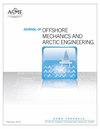Assessing Fatigue Damage in the Reuse of a Decommissioned Offshore Jacket Platform to Support a Wind Turbine
IF 1.3
4区 工程技术
Q3 ENGINEERING, MECHANICAL
Journal of Offshore Mechanics and Arctic Engineering-Transactions of the Asme
Pub Date : 2023-02-20
DOI:10.1115/1.4056943
引用次数: 1
Abstract
An offshore energy transition, even if only a gradual one, from carbon-emitting fossil fuel extraction to cleaner sources is recommended, if we are to slow the harmful impacts of climate change. The potential for sustainable reuse of decommissioned offshore jacket platforms to support wind turbines is being considered as an attractive proposition in such a transition. To maximize the benefits of such reuse of assets, what is needed is a rational optimization strategy that considers the remaining life of a repurposed platform, associated retrofit and construction costs, and a future period of gross renewable energy generation following installation of the wind turbine. We outline a study that employs a fatigue reliability-based framework, based on the global fatigue approach and Palmgren-Miner's rule, to aid in such sustainable reuse planning and optimization. The framework proposed identifies an optimized reuse plan that incorporates metocean data analysis, structural analysis, life-cycle evaluation, and revenue optimization. We employ a case study and sustainable reuse scenario for a site in the vicinity of Porto (Leixoes), Portugal.退役海上导管架平台支撑风力发电机的疲劳损伤评估
如果我们要减缓气候变化的有害影响,建议从碳排放的化石燃料开采向清洁能源过渡,即使只是渐进的过渡。退役海上导管架平台可持续再利用以支持风力涡轮机的潜力被认为是这种转型中一个有吸引力的提议。为了最大限度地提高资产再利用的效益,需要一种合理的优化策略,考虑重新利用平台的剩余寿命、相关的改造和建设成本,以及安装风力涡轮机后的未来可再生能源发电总量。我们概述了一项研究,该研究采用了基于疲劳可靠性的框架,基于全局疲劳方法和Palmgren-Miner规则,以帮助进行这种可持续的重用规划和优化。所提出的框架确定了一个优化的重用计划,该计划包括metocean数据分析、结构分析、生命周期评估和收入优化。我们对葡萄牙波尔图附近的一个场地进行了案例研究和可持续再利用方案。
本文章由计算机程序翻译,如有差异,请以英文原文为准。
求助全文
约1分钟内获得全文
求助全文
来源期刊
CiteScore
4.20
自引率
6.20%
发文量
63
审稿时长
6-12 weeks
期刊介绍:
The Journal of Offshore Mechanics and Arctic Engineering is an international resource for original peer-reviewed research that advances the state of knowledge on all aspects of analysis, design, and technology development in ocean, offshore, arctic, and related fields. Its main goals are to provide a forum for timely and in-depth exchanges of scientific and technical information among researchers and engineers. It emphasizes fundamental research and development studies as well as review articles that offer either retrospective perspectives on well-established topics or exposures to innovative or novel developments. Case histories are not encouraged. The journal also documents significant developments in related fields and major accomplishments of renowned scientists by programming themed issues to record such events.
Scope: Offshore Mechanics, Drilling Technology, Fixed and Floating Production Systems; Ocean Engineering, Hydrodynamics, and Ship Motions; Ocean Climate Statistics, Storms, Extremes, and Hurricanes; Structural Mechanics; Safety, Reliability, Risk Assessment, and Uncertainty Quantification; Riser Mechanics, Cable and Mooring Dynamics, Pipeline and Subsea Technology; Materials Engineering, Fatigue, Fracture, Welding Technology, Non-destructive Testing, Inspection Technologies, Corrosion Protection and Control; Fluid-structure Interaction, Computational Fluid Dynamics, Flow and Vortex-Induced Vibrations; Marine and Offshore Geotechnics, Soil Mechanics, Soil-pipeline Interaction; Ocean Renewable Energy; Ocean Space Utilization and Aquaculture Engineering; Petroleum Technology; Polar and Arctic Science and Technology, Ice Mechanics, Arctic Drilling and Exploration, Arctic Structures, Ice-structure and Ship Interaction, Permafrost Engineering, Arctic and Thermal Design.

 求助内容:
求助内容: 应助结果提醒方式:
应助结果提醒方式:


